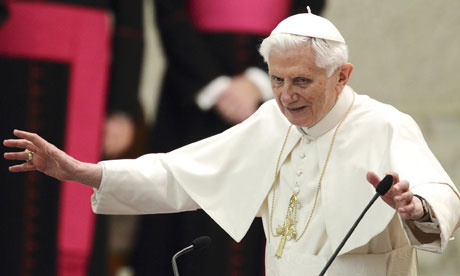Letter #11: Without a Script
February 14, 2013 by
February 14, 2013, Thursday — Without a Script
“Only a permanent formation of the heart and mind can actually create intelligibility and participation which is more than one external activity, which is an entering of the person, of his or her being into communion with the Church and thus in fellowship with Christ.”—Pope Benedict XVI this morning, in his annual address to the clergy of Rome, in the Paul VI Audience Hall in Vatican City; the talk was delivered without a written text, as in a conversation, or university seminar.
Pope to Rome’s priests: The Second Vatican Council, As I Saw It
The remarkable thing about Pope Benedict’s talk today to the clergy of Rome, several thousand strong, was that he did not speak from a prepared text. He spoke freely, familiarly. It was an impressive performance.
For nearly 50 minutes, the 85-year-old pontiff — who on Monday stunned the world with the abrupt announcement of his decision to leave the papacy on February 28 — spoke “a braccio” (“off the cuff”) somehwat as a professor may speak to his students in a university seminar.
It seemed that this “professor Pope” has, in the final days of his papacy, in fact truly become the “professor Pope.”
It is as if the weight of speaking with magisterial authority, which already in the past seemed to make this Pope occasionally uncomfortable (as when he issued his books on Jesus under the names both of “Joseph Ratzinger” and of “Pope Benedict XVI”) is already, two weeks before his resignation, being lifted off of his shoulders.
His manner of speaking today reminded me of several conversations I was able to have with him in the 1990s, when he, as Cardinal Ratzinger, spoke with me, a young journalist, about some of the matters he discussed today.
Benedict seemed very much at ease, though he was evidently a bit tired (one of his eyes sometimes almost closed as he spoke).
The Pope offered a personal account to Rome’s clergy of his own experience of the Second Vatican Council, and of what the Council intended.
Because it is one of the last times he will speak publicly to a large audience as Pope, the talk was closely followed by Vatican watchers.
What was the Pope’s “message” as he prepares to renounce his office on February 28?
Essentially, that the documents of Vatican II were works of great value which responded to real concerns and problems facing the Church, but which were later distorted, often by the world’s media, which had their own agenda, leading to much confusion and “misery.”
In particular, Benedict said that the popular understanding of Vatican II has been distorted presentations of the Council as a political struggle for “popular sovereignty” in the Church. This “Council of the media” was responsible for “many calamities, so many problems, so much misery,” the Pope said. He listed the miseries: “Seminaries closed, convents closed, liturgy trivialized.”
But the Pope said that the “true Council” is today “emerging with all its spiritual strength,” and he called on the priests to “work so that the true Council with the power of the Holy Spirit is realized and the Church is really renewed.”
At the very beginning if his papacy, almost 8 years ago, Benedict called for a reading of Vatican II “in continuity” with the Church’s 2,000-year doctrine, not as a “rupture” with that past. His talk today was a re-emphasis of this teaching.

No comments:
Post a Comment